On Gandhi Jayanti, Hindus for Human Rights Members Message on Hindu-Muslim Unity
NIKHIL MANDALAPARTHY, ADVOCACY DIRECTOR
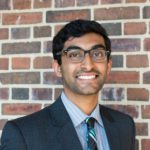
Three days before he was assassinated, Gandhi visited the dargah (shrine) of the Sufi saint Khwaja Qutbduddin Bakhtiyar Kaki near Delhi. The dargah had been attacked by Hindu rioters in the aftermath of India’s Partition, and Muslim residents of the area had been forced to flee. At the dargah, Gandhi told those who were gathered there that “I have come on a pilgrimage. I request Muslims, Hindus and Sikhs who have come here with cleansed hearts to take a vow that they will never allow strife to raise its head, but will live in amity, united as friends and brothers.” When I visited this dargah and others in 2019 as a journalist seeking to understand how Hindu nationalism was affecting India’s Sufi shrines, I got a brief glimpse of the pluralistic India that Gandhi hoped for: a place where Hindus, Muslims, Sikhs, and others were praying together, side by side. Despite his views on race, caste, and gender — which I still struggle to reconcile with my own politics — it is Gandhi’s stubborn and fierce commitment to India’s religious pluralism which I believe needs to be celebrated today.
SAPTHAGIRI IYENGAR, HfHR COFOUNDER AND ADVOCACY INTERN33
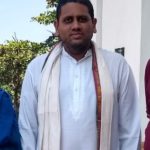
“What I see around me today is, therefore, a reaction against the spread of non-violence. I feel the wave of violence coming. The Hindu-Muslim tension is an acute phase of this tiredness.”*
“…Hindus and Mussulmans prate about no compulsion in religion. What is it but compulsion, if Hindus will kill a Mussulman for saving a cow?”*
Gandhi stubbornly resisted any allusions to him being considered a seer. Yet, it is eerily coincidental that today’s India is living the reality that Gandhi dreaded the most a hundred years since. The “wave of violence” Gandhi felt a century ago has assumed its fullest, most sinister expression through the current regime of the BJP government backed by the RSS, the organization that orchestrated Gandhi’s assassination. “Compulsion in religion” has been given constitutional sanctity by the same government which turns a blind eye to lynching of Muslims in the name of “cow protection.”
The need of the hour rings true today as it did a century ago.
“…We need, not force of arms, but force of will. If we have not the latter, we shall never get the former. If we develop the force of will, we shall find that we do not need the force of arms.”*
*All quotes are Gandhi’s own words in Hindu-Muslim Tension, Its Causes and Cure, Young India, 29 May 1924.
SHAWINTALA BANWARIE, Holland-based HfHR member

Every year when Gandhi Jayanti arrives I hope that more Hindus and Muslims are going to break prejudices and stereotypes about each other. For Hindus, it is important to learn more about Islam and by doing so take away all the negative stereotyping about Muslims.
As Gandhi Ji wonderfully explained:
“I become more than ever convinced that it was not the sword that won a place for Islam in those days. It was the rigid simplicity, the utter self-effacement of Hussein, the scrupulous regard for pledges, his intense devotion to his friends and followers and his intrepidity, his fearlessness, his absolute trust in God and in his own mission. These and not the sword carried everything before them and surmounted every obstacle.”
VIJAYENDRA KADALABAL, HfHR Board member
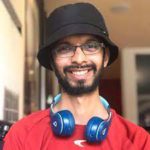
As a young privileged individual from urban India, I have always been critical of many individuals including Gandhi. But with every passing year in the last decade, I am becoming aware of how relevant Gandhi’s teachings are. More so with the divisive world we are living in today. His messages of “Ahimsa Paramo Dharma” (Non-violence is the most essential Dharma, borrowed form Mahabharata) and “an eye for an eye makes the whole world blind”, particularly make me think how important it is for the young population in India specifically from the Hindu and Muslim communities, to not fall into the trap of hate-politics. To deepen their understanding of each other by co-existing. To acknowledge the beauty in the diversity. And to learn to respectfully disagree. I am hoping our younger population learn this lesson from Gandhi and practice it in their individual as well as collective spaces. I am hoping to witness a reversal in the hateful narrative that I am currently surrounded by.
URMILA KUTIKKAD, Board member HfHR
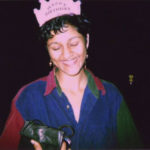
As we come upon the 152nd Gandhi Jayanti, I am preoccupied with Gandhi ji’s given honorific, “Mahātmā (महात्मा).” Broken down into Sanskrit, we are given “महा mahā” (great) + “आत्मन ātman” (soul), or great soul. Among Gandhi ji’s prolific words and works, he has spoken of the atman many times, but I am always drawn to one quote in particular, written in the journal Young India in September 1924: “I believe in the absolute oneness of God and therefore of humanity. What though we have many bodies? We have but one soul. The rays of the sun are many through refraction. But they have the same source. I cannot, therefore, detach myself from the wickedest soul, nor may I be denied identity with the most virtuous.” Thus, as we are presented with the “great soul” of Gandhi ji, we are also presented with the great soul within ourselves — and, conversely, as we reconsider Gandhi ji in the light of his flaws, we are presented with our own. In a world where we tear each other down and apart daily on the basis of religion, caste, race, gender, sexuality, and on, it is critical on this Gandhi Jayanti that we return to the root of what Gandhi ji preached: that we emanate from the same sun, that we are the same sun. In such a world there is no room for hate politics, for violence, for domination; there is only room to burn brighter and fiercer in unison.
SUNITA VISWANATH, COFOUNDER HfHR
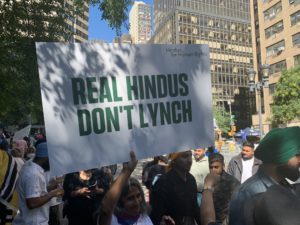
Gandhiji spent the months leading up to Independence Day, August 15, 1947, traveling to parts of India where Hindus and Muslims were slaughtering each other, and trying to bring about peace.
In March 1947, he said at a prayer gathering in Noakhali, “Muslims will not serve Islam if they annihilate the Hindus; rather they would thereby destroy Islam. And if the Hindus believe that they would be able to annihilate Islam it means that they would be annihilating Hindu dharma…”
In the months following independence, Gandhiji’s singular focus was travelling across the country, building peace among Hindus and Muslims. In Fatehpur, he told the Muslims, “It is the easiest thing to harass the Hindus here, as you Muslims are in the majority. But is it just as honourable? Show me, please, if such a mean action is suggested anywhere in your Koran. I am a student of the Koran…So, in all humility, I appeal to you to dissuade your people from committing such crimes.”
Five months later, Gandhi was in Delhi, once again on hunger strike. Gandhi was fasting “unto death,” demanding that mosques converted to temples and homes should be restored to their original uses, that Muslims be allowed to move freely, and that boycotts against them end.
On January 14th, 1948, Gandhiji was assassinated by a Hindu extremist who believed he had a “persistent policy of appeasement towards the Muslims.” Gandhiji has always been willing to die for the cause of the persecuted. After security was achieved for Muslims in India, Gandhiji hoped to leave for Pakistan. “I shall die for the Hindus and the Sikhs there,” he said. “I shall be really glad to die there’.




